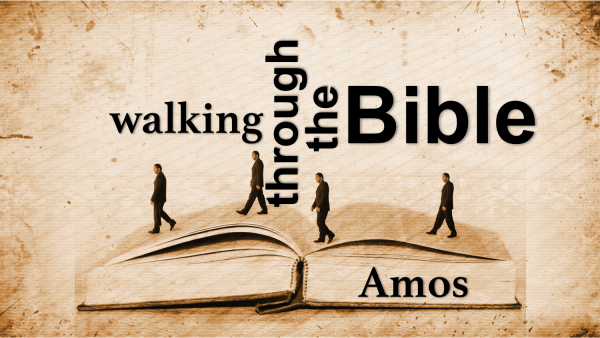To realize the perspective from which Amos writes it is necessary to date his work so as to understand the conditions of the immediate time. Amos provided this timeframe in the first verse by saying that these were “The words of Amos, who was among the herdmen of Tekoa, which he saw concerning Israel in the days of Uzziah king of Judah, and in the days of Jeroboam the son of Joash king of Israel, two years before the earthquake.” The reigns of these two kings would have coincided around the year 765 B.C. indicating this as the year of his call to the work. Amos also identifies this time as two years before “the earthquake” of which nothing is really known. Zechariah also mentioned this earthquake some two hundred years after Amos so it must have been of unusual significance and magnitude. The reigns of Jeroboam and Uzziah were marked by great success resulting in prosperity. The borders of each nation were enlarged and through trade, agriculture, and conquest of other peoples a great deal of wealth had become theirs’. However, the result of such prosperity, as throughout the Jews’ history, was corruption morally, politically, and religiously. God then would use the natural appeal of such prosperity to bring other nations against His people that they might be humbled back into faithful service.
When Amos was sent to the people of God he warned both Israel and Judah that neither would escape divine retribution for their sins. Amos is known as the “prophet of woe” for the manifold message of doom he delivered. One might consider Amos 6 which is a continued list of woes upon the people. Among the many, though, is one that characterized the Jews as well as any statement made about them or to them in their history. In Amos 6:1, the prophet pronounces, “Woe to them that are at ease in Zion, and trust in the mountain of Samaria, which are named chief of the nations, to whom the house of Israel came!” God’s people throughout their history were marked by their “ease in Zion” and “trust in Samaria,” referring to the assumed security that they felt in the land. It was as though they believed that the land bestowed by God was invincible to any form of attack. Their history should have prepared them for a better conclusion than that, seeing as how already they had been taken from their land multiple times before (Judges 1ff). God would have to break their spirits again to prove to them that He is God, and He alone.
There is a general lesson provided in Amos that all people, nations, and languages would do well to hear and heed. In Amos 4:12, Amos counseled the people that, “Therefore thus will I do unto thee, O Israel: and because I will do this unto thee, prepare to meet thy God, O Israel.” These people needed to know that they were not indestructible, but that they like all others would give an account to God one day for their actions. For this they needed immediately to prepare. It is amazing that almost 3,000 years have passed since Amos told the Jewish nation to prepare to meet God, and yet many still believe that they have all the time in the world to prepare. Friends, if it was necessary to make an immediate change then, it is even more so today!
At the end of Amos’ prophetic book, Amos leaves the people with this message of hope: “In that day will I raise up the tabernacle of David that is fallen, and close up the breaches thereof; and I will raise up his ruins, and I will build it as in the days of old: that they may possess the remnant of Edom, and of all the heathen, which are called by my name, saith the Lord that doeth this” (Amos 9:11-12; see also vs. 13-15). Here is a clear look forward to the restoration of the people not only physically upon their repentance, but spiritually through “the tabernacle of David” Jesus Christ, the seed through whom all blessings flow.
Israel and Judah had a very important lesson to learn in those fateful years to come. Sadly they had to learn them the hard way, but God has preserved these records for the learning of all men today (Romans 15:4) that similar mistakes might be avoided. When will our people awaken to the reality of God’s judgment? It is sure, but are we?

